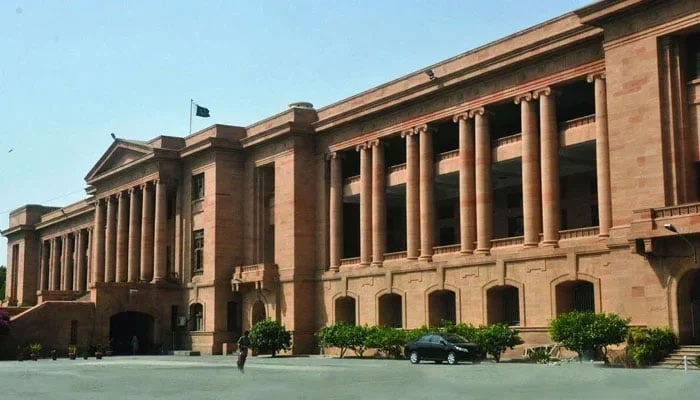SHC orders hearing of 28-year-old lawsuit on Nov 6
The Sindh High Court (SHC) has directed its office to fix the date for next week to conclude a 28-year-old lawsuit seeking damages of Rs1 million. The case had been filed by a former judge against a private bank.
Former district & sessions judge Agha Rafiq Ahmed, who later became the chief justice of the Federal Shariat Court, had filed the lawsuit against a private commercial bank over a credit card issue in November 1996, and it took 28 years to reach the stage of final arguments.
A single SHC bench of Justice Omar Sial asked the counsel how this lawsuit fell within the pecuniary jurisdiction of the court. The counsel replied that the lawsuit did not fall within the pecuniary jurisdiction when it had been filed.
The bank’s counsel said the suit should be transferred to the court that has jurisdiction. However, the plaintiff’s counsel argued that this court can decide the case considering the SHC chief justice’s order of December 12, 2002.
The bench said the suit was filed on November 5, 1996, when the high court had the pecuniary jurisdiction to entertain it, but on September 10, 2002, the provincial government amended the Sindh Civil Courts Ordinance, 1962, by passing the Sindh Civil Courts (Amendment) Ordinance, 2002.
The court said that due to the amendment, suits valued up to Rs3 million at that stage were to be transferred from the high court to the district courts, adding that this suit too was transferred pursuant to the amended ordinance.
The bench said the case was recalled from the sessions court to the SHC after the CJ’s order on the request of the counsel, who said that complicated and important questions of law were involved, and the decision whereof would have far-reaching effects on the validity of electronic transactions.
The court said the plaintiff’s counsel had rightly argued that the SHC order of December 12, 2002, had been passed on a transfer application, and thus, Section 24 of the Code of Civil Procedure would be attracted.
The bench said Section 24 gives the high court the power to withdraw any suit, appeal or other proceeding pending in any court subordinate to it and (i) try or dispose of the same or (ii) transfer the same for trial or disposal to any court subordinate to it and competent to try or dispose of the same or (iii) re-transfer the same for trial or disposal to the court from which it was withdrawn.
The court said the lawsuit had been transferred to the district court after the amended ordinance, but it had been brought back to the SHC under its powers under Section 24 for the reasons given in the order.
The bench said the issue of consent to oust jurisdiction is not material, adding that the court has jurisdiction to hear the case, then directed the court’s office to fix the case for further hearing on November 6.
-
 Man Convicted After DNA Links Him To 20-year-old Rape Case
Man Convicted After DNA Links Him To 20-year-old Rape Case -
 Royal Expert Shares Update In Kate Middleton's Relationship With Princess Eugenie, Beatrice
Royal Expert Shares Update In Kate Middleton's Relationship With Princess Eugenie, Beatrice -
 Andrew Mountbatten-Windsor’s Leaves King Charles With No Choice: ‘Its’ Not Business As Usual’
Andrew Mountbatten-Windsor’s Leaves King Charles With No Choice: ‘Its’ Not Business As Usual’ -
 Dua Lipa Wishes Her 'always And Forever' Callum Turner Happy Birthday
Dua Lipa Wishes Her 'always And Forever' Callum Turner Happy Birthday -
 Police Dressed As Money Heist, Captain America Raid Mobile Theft At Carnival
Police Dressed As Money Heist, Captain America Raid Mobile Theft At Carnival -
 Winter Olympics 2026: Top Contenders Poised To Win Gold In Women’s Figure Skating
Winter Olympics 2026: Top Contenders Poised To Win Gold In Women’s Figure Skating -
 Inside The Moment King Charles Put Prince William In His Place For Speaking Against Andrew
Inside The Moment King Charles Put Prince William In His Place For Speaking Against Andrew -
 Will AI Take Your Job After Graduation? Here’s What Research Really Says
Will AI Take Your Job After Graduation? Here’s What Research Really Says -
 California Cop Accused Of Using Bogus 911 Calls To Reach Ex-partner
California Cop Accused Of Using Bogus 911 Calls To Reach Ex-partner -
 AI Film School Trains Hollywood's Next Generation Of Filmmakers
AI Film School Trains Hollywood's Next Generation Of Filmmakers -
 Royal Expert Claims Meghan Markle Is 'running Out Of Friends'
Royal Expert Claims Meghan Markle Is 'running Out Of Friends' -
 Bruno Mars' Valentine's Day Surprise Labelled 'classy Promo Move'
Bruno Mars' Valentine's Day Surprise Labelled 'classy Promo Move' -
 Ed Sheeran Shares His Trick Of Turning Bad Memories Into Happy Ones
Ed Sheeran Shares His Trick Of Turning Bad Memories Into Happy Ones -
 Teyana Taylor Reflects On Her Friendship With Julia Roberts
Teyana Taylor Reflects On Her Friendship With Julia Roberts -
 Bright Green Comet C/2024 E1 Nears Closest Approach Before Leaving Solar System
Bright Green Comet C/2024 E1 Nears Closest Approach Before Leaving Solar System -
 Meghan Markle Warns Prince Harry As Royal Family Lands In 'biggest Crises' Since Death Of Princess Diana
Meghan Markle Warns Prince Harry As Royal Family Lands In 'biggest Crises' Since Death Of Princess Diana




